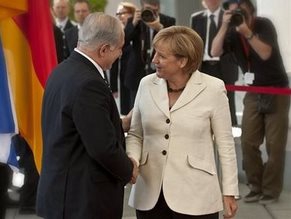|
World Jewish News

Prime Minister Benjamin Netanyahu with German Chancellor Angela Merkel before a meeting in Jerusalem on Jan. 31, 2011. Photo by: Reuters
|
Netanyahu warns outcome of Egypt revolution could be like Iran's
31.01.2011, Israel and the World What happened in Iran could happen in Egypt, Prime Minister Benjamin Netanyahu said on Monday after meeting with German Chancellor Angela Merkel.
The German chancellor, who arrived in Israel earlier in the day, told Netanyahu during the meeting that it was especially important to move the peace process between Israel and the Palestinians forward in light of the unrest in Egypt.
In Israel's neighboring Egypt, demonstrations and riots have continued unabated for almost a week straight. Netanyahu and Merkel reportedly spent a large amount of time during their meeting discussing the unrest.
Netanyahu expressed fears that a radical Islamic regime like the one in Iran could also come to power in Egypt.
"Our real fear is of a situation that could develop ... and which has already developed in several countries including Iran itself -- repressive regimes of radical Islam," said Netanyahu.
Netanyahu continued, adding that although the protests may not be motivated by religious extremism, "in a situation of chaos, an organized Islamist body can seize control of a country. It happened in Iran. It happened in other instances".
Merkel defended the Western reaction to the protests in Cairo against criticism in Israel that the United States and Europe were dumping a loyal ally.
"I don't think that we've left Egypt in the lurch," she said, adding that she had spoken with Mubarak by telephone on Sunday. "We talked ... about where there are deficits, for example in connection with human rights and press freedoms and electoral law ... and employment for young people," Merkel said.
The German chancellor continued, "you can't divide your principles and say my principles are valid for some countries, where you can speak your mind and vote freely, but in other countries these principles don't hold at all."
During the meeting, Merkel called on Netanyahu to stop settlement building in the West Bank, which she said is hurting the peace process.
Peace talks initiated by the United States grinded to a halt in September after a 10 month freeze on West Bank settlement building expired. Attempts to restart the talks have since failed, with the Palestinians insisting that they won't negotiate without a complete settlement freeze. Israel has meanwhile insisted that they are ready to continue negotiations, but they are waiting for the Palestinians to return to the table.
Netanyahu responded to Merkel by saying that settlements were not an obstacle to peace, adding that settlement building under his government has decreased greatly in comparison to previous governments. He also said that it was up to the Palestinians to return to the negotiating table and renew peace talks.
Senior officials in Merkel's office have said recently during closed door briefings that the chancellor will be very tough with Netanyahu and will use the meeting as a chance to tell him that it is his responsibility to renew the peace negotiations with the Palestinians.
Merkel arrived in Israel on Monday as part of the third round of talks in an ongoing dialogue between the two countries.
By Reuters and Barak Ravid
Haaretz.com
|
|
